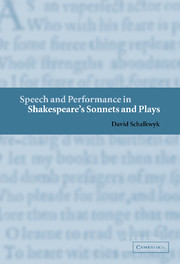Book contents
- Frontmatter
- Contents
- Acknowledgements
- Introduction: the sonnets
- 1 Performatives: the sonnets, Antony and Cleopatra and As You Like It
- 2 Embodiment: the sonnets, Love's Labour's Lost, Romeo and Juliet and Twelfth Night
- 3 Interiority: the sonnets, Hamlet and King Lear
- 4 Names: the sonnets, Romeo and Juliet, Troilus and Cressida and Othello
- 5 Transformations: the sonnets and All's Well that Ends Well
- Conclusion
- Bibliography
- Index
4 - Names: the sonnets, Romeo and Juliet, Troilus and Cressida and Othello
Published online by Cambridge University Press: 22 September 2009
- Frontmatter
- Contents
- Acknowledgements
- Introduction: the sonnets
- 1 Performatives: the sonnets, Antony and Cleopatra and As You Like It
- 2 Embodiment: the sonnets, Love's Labour's Lost, Romeo and Juliet and Twelfth Night
- 3 Interiority: the sonnets, Hamlet and King Lear
- 4 Names: the sonnets, Romeo and Juliet, Troilus and Cressida and Othello
- 5 Transformations: the sonnets and All's Well that Ends Well
- Conclusion
- Bibliography
- Index
Summary
I have argued that the concept of the performative, of what words may do rather than merely say, transforms the notion of ‘truth’ in Shakespeare's sonnets and plays in decisive ways. The power of language not to reflect but to transform the world through forms of social action unites the sonnets and plays such as Antony and Cleopatra or As You Like It, where conditions of sufficient social or personal cohesion enable the performative to do its proper work. Such work depends upon particular kinds of imagined or real social worlds, worlds in which the requisite speech acts and language games are sustained by what Lars Engle has called the ‘thick deeps’ of contingent rather than transcendental certainty. We can respond to Cleopatra's transformations of herself and her lover, or the player-poet's elevation of the young man into the paradigm instance of ‘truth’, or the accommodations of mutual falsehood in the dark-woman poems, because the texts themselves work within vital frameworks of consensual linguistic practice. These constitute the performative power of their speech acts, even when such acts empower certain kinds of withdrawal or escape from a wider social or political realm. Many acts of this kind are self-authorising. They do not merely conform to the settled conventions and sanctioned capacities that are constitutive of the performative as it appears in Austin's and Searle's more conservative moments of analysis.
- Type
- Chapter
- Information
- Speech and Performance in Shakespeare's Sonnets and Plays , pp. 150 - 197Publisher: Cambridge University PressPrint publication year: 2002



